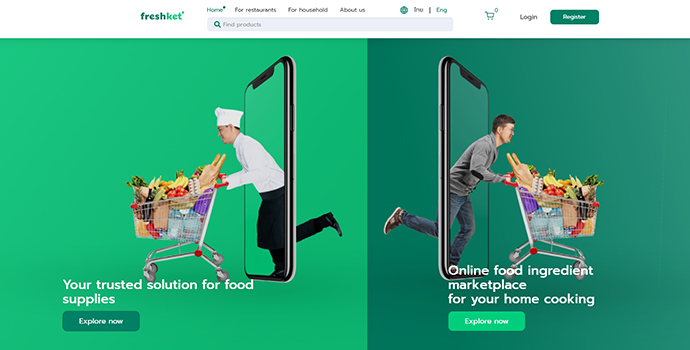
More than one year on since the pandemic first struck, economies across the world are still dealing with the devastating ripple effects of lockdowns, travel restrictions, and lower consumption levels.
Over the past year, COVID-19 has undoubtedly wreaked havoc on the global market. According to the International Monetary Fund, the world economy shrunk by 4.4% last year, the most severe contraction since the Great Depression.
The Dow Jones recorded the largest-ever single-day loss of almost 3,000 points on 16 March last year, at the height of the first wave. Unemployment rates surged, while tourism, airline, and hospitality industries came to a standstill. Supply chains were disrupted by nationwide shutdowns and staff shortages. Today, COVID-19 continues to pose the most threat to growth for businesses across the world.
Thailand is no exception. The tourism-dependent nation expects only 700,000 travellers to enter Thailand this year, compared to almost 40 million just two years prior. Amidst the latest wave of infections, the central bank has slashed its yearly economic growth forecast down to 1.8%.
But, despite the dim economic outlook, Thailand’s startup ecosystem is thriving.
Resilience amidst crisis
The country’s tech industry is among the few sectors that have stayed afloat in spite of the pandemic — and, in some cases, because of it.
Last year, there were 40 million new internet users across Southeast Asia, according to the 2020 Google e-Conomy SEA report. In Thailand, 3 out of 10 users were new and only adopted digital services because of the pandemic. Thais also now spend an average of 4.6 hours online every day, compared to 3.7 hours before the pandemic.
Some of Thailand’s leading startups have enjoyed double-digit revenue growth since the pandemic began.
Also read: Bringing the gold standard when it comes to gold trading powered by fintech
One of the areas that have seen blistering growth is e-commerce, which grew by 60% during the pandemic. E-commerce solutions startup aCommerce recorded year-on-year growth of 130% between the second quarters of 2019 and 2020, as consumers turned to online shopping amidst safe distancing measures.
Similarly, fintech firm SYNQA doubled its revenue from 2019 to 2020, thanks to spikes in online food delivery orders. Enterprise software startup Eko also saw 200% year-on-year growth last year, along with a 50% increase in revenue from February to August.
More recently, Thailand produced its first unicorn — a startup valued at more than US$1 billion. The honour went to homegrown e-commerce logistics company Flash Group, which raised US$150 million in its recent Series D+ and E funding rounds.
How Freshket remained agile and adaptable during the pandemic

Another homegrown success story from Thailand is food supply chain platform Freshket. The Bangkok-based startup leverages technology to deliver sustainable end-to-end solutions for both restaurants and households.
In a nutshell, Freshket simplifies the process of food supply management.
Also read: How SMBs grow their business with TikTok
They do this via digitalising, automating, and equalising the entire food supply chain process. This is done via developing order, warehouse, and logistics management systems, automating them, and then aggregating the products based on supply and demand to provide fairer prices.
This is how it works:
Restaurants first place their orders via the Freshket website or mobile apps. The orders are then consolidated and Freshket purchases the food products from suppliers and farmers in bulk. These products are then delivered to processing or distribution centres, where products are selected, aggregated, and packed into boxes.
Next, these boxes go out to hubs located across the city, which makes it easier and quicker to deliver to restaurants. Finally, drivers located at each hub will collect and deliver these boxes.
What makes Freshket unique is that they manage the entire food supply chain from start to finish and optimise it with technology.

“We control the whole food supply chain process end-to-end,” said Ponglada Paniangwet, chief executive officer and co-founder of Freshket. “All of this creates a reliable service experience for the restaurants.”
Growing up in a family that has been in agriculture for 25 years, Ms Paniangwet quickly realised that the food supply industry faced many problems.
For one, suppliers and farmers are unable to control variables such as product quality and delivery times. The fragmented nature of the food supply industry means that the ecosystem is inefficient and inconvenient. Hence, she set out to provide a solution, which eventually developed into Freshket.
Freshket has weathered through the past year despite the pandemic. Last year, Freshket raised US$3 million in a Series A round led by Singapore’s Openspace Ventures.
This milestone was achieved in spite of temporary restaurant shutdowns which resulted in more than 80% of their orders being cancelled. Within a single day — from 22 March, when the shutdown was announced, to 23 March — Freshket opened up its platform for consumers. The pivot proved successful, with consumer revenue making up for the loss in restaurant revenue, and helped them tide through the pandemic.
Freshket has successfully developed a supply chain network, targeting Thailand’s fragmented food supply chain. Currently, the country’s foodservice market is worth more than US$7.7 billion in annual purchases, which means that the startup has much room for expansion.
In the future, Freshket hopes to diversify its business segment and bring schools, hospitals, and modern trade into the fold. The startup also intends to develop a supply chain financing model and expand to cities abroad, bringing with it the industry-specific tech expertise needed to streamline food supply chains across the world.
Part of the reason Freshket has managed to thrive is because of the buzzing Thai startup ecosystem. Having persevered amidst the pandemic, Thailand’s startup industry boasts a plethora of promising startups that are poised for growth.
– –
This article is part of NIA’s Startup Thailand Marketplace project.
The post How Thai food supply chain startup Freshket weathered through the pandemic appeared first on e27.

